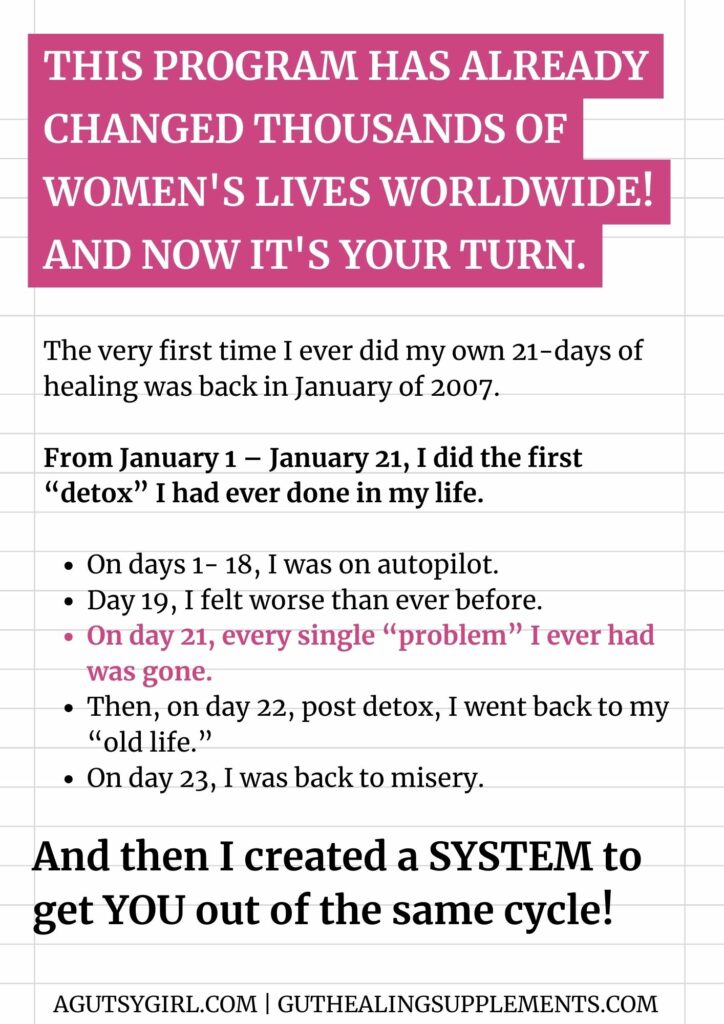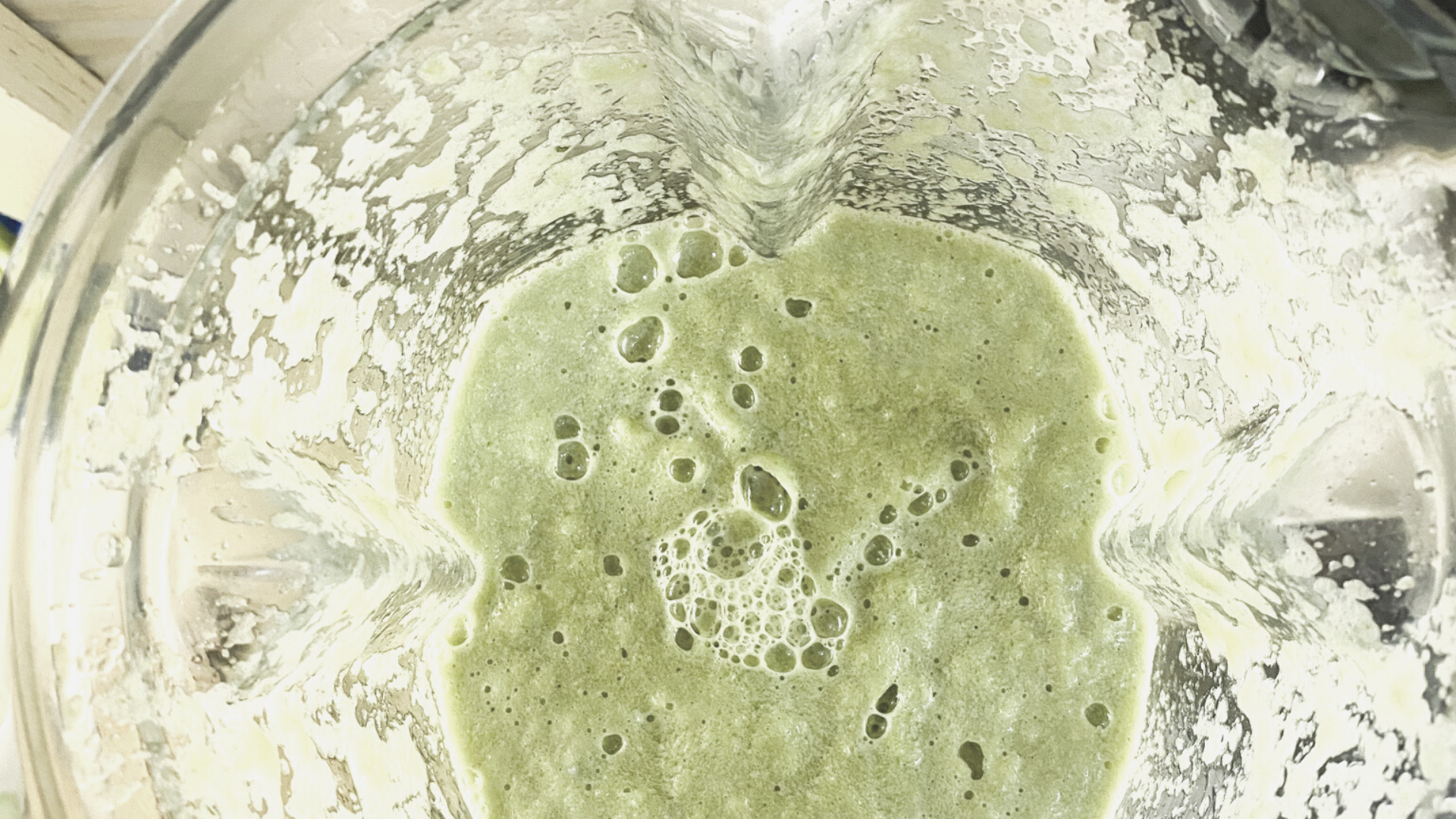Bloating after eating any meal is common (not normal), but today I want to address the rise ‘n shine. I have 9 ways to avoid bloating after breakfast.
The focus is breakfast because I know you struggle with that. And I did, too. Here is what a typical morning looks like for you:
- wake up, okay
- physically get up, average
- eat anything, even a crumb, bloated to 9 months pregnant
Because I’ve been in those same shoes, I want to help.
2 Reasons to Avoid Morning Bloat
But first, here are 2 reasons it’s critical to avoid the morning bloat:
1. Sets the tone
The morning, like it or not, sets the tone for your entire day. It’s why I focus so much on nailing the morning routine on A Gutsy Girl. (See: 8 Ways to Begin a Meaningful Morning Practice and 5 Morning Power-Up Rituals)
I know that what happens in the morning can make or break your day. If bloat is part of the equation, you’ll struggle to make it.
2. Journaling is more difficult
Yes, the art of journaling for gut healing.
I’m never going to stop talking about it because I whole-heartedly believe in as part of the healing process. But when bloat occurs first thing in the morning you will feel much less motivated to use the journal.
More than that is you’ll need to record even more in order to have clear understanding. Even if you don’t need to, you’ll believe you do. It’s exhausting.
Alright, now let’s discuss how you can avoid bloating after breakfast.
9 Ways to Avoid Bloating After Breakfast
Click HERE to save these 9 ways to avoid bloating after breakfast for later.
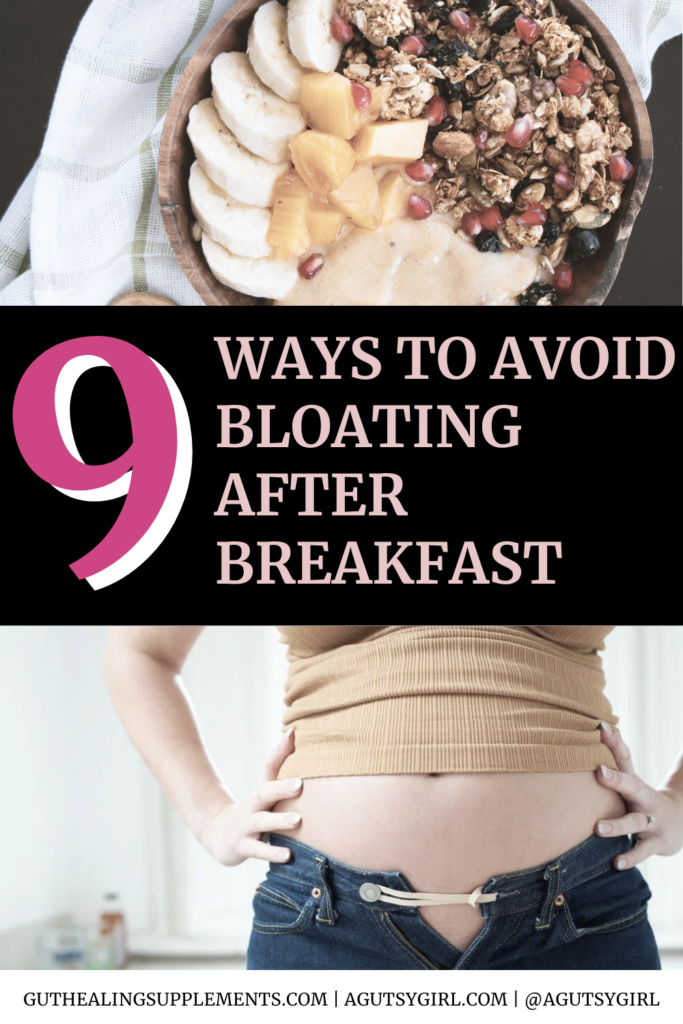
1. Fast
Wait to break the fast.
Actually, truly, and 100% one of my very best ways for avoiding bloating after breakfast.
Don’t eat it at all.
Now, before the hormone and intuitive eating police come after me, let me be very clear. Intermittent Fasting (IF) is not now, nor will it ever be, for everyone under any circumstance.
However, if you practice IF appropriately for your unique circumstances, it can be life changing.
It was for me, and it has been for many others. And remember, just because you don’t eat breakfast per the usual, doesn’t necessarily mean you don’t eat it at all.
I still eat breakfast, but it’s just later and always plump full of calories and gut-health foods.
2. Choose the right breakfast
What is “right?” That is completely dependent upon you and your own, unique situation. What I can tell you, though, is that if you have been eating the same 3 breakfasts for the past several months and each day you’re bloated after breakfast, something is clearly not working.
This is where your gut healing journal will come in handy.
I could list out many different breakfast options, but again, it would mean nothing for you. Because only you know your full health status.
There are, however, many ideas and options, that you can customize for you, in A Gutsy Girl’s Bible.
Note: if you want to hear more about my mornings, including intermittent fasting and breakfast, I recorded an episode with my daily routine.
3. Digesting breakfast
Remember, even if you have chosen the right breakfast, you might still need help digesting it.
For example, a “right” breakfast for me during SIBO healing consisted of: a cup of bone broth, sautéed low-FODMAP greens in coconut or olive oil and meat of some sort (usually ground beef or bison).
But I didn’t just eat that and call it good.
Because I knew my enzymes were low, motility slow, and stomach acid was weak, I always made sure to take a digestive enzyme and HCL with that particular breakfast.
In addition, I’d squeeze fresh lemon in the bone broth for even more natural stomach acid production.
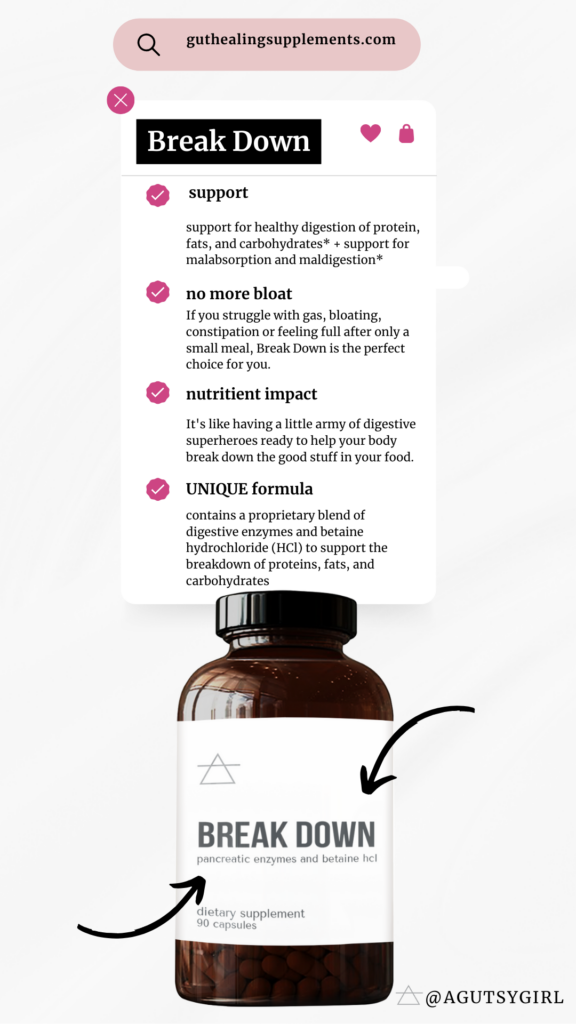
Looking for a practitioner-grade digestive enzyme that also includes a smidge of HCl? Break Down, from the A Gutsy Girl supplement line has it!
Try it today and use code ‘AGUTSYGIRL’ at checkout to save 15%.
4. Stay put
Stop grabbing a piece of toast with jam and fleeing for the door.
Do whatever you can to mono-task breakfast. If you can’t mono-task it, then see #1 and wait until you can.
Remember, sometimes it’s more about how you’re eating vs what you’re eating.
5. Create body awareness
Once your breakfast has been made, sit down, take a deep breath and enjoy it.
Savor the bites, clear away distractions, take deep breaths, and tune into how your body feels while eating the breakfast.
Ask yourself, “How is this working for me?“
p.s. Asking yourself this question is so important that I have included it in your gut healing journal.
6. Chew appropriately
If you can’t stay put, this one is most definitely not happening. But even if you are sitting in place, it’s also likely not happening often.
Each bite of food should be 30-ish chews prior to swallowing. The more ground up the food is with saliva, the more it’s pre-digested before even swallowing.
This is why we digest liquids better than solids.
7. Re-think the workout
Consider that your early-morning workout might not be serving you anymore.
I know, I know — all the experts say that “for best results” you should workout hard, first thing in the morning, on an empty stomach.
I can’t count the number of times I did that throughout the years only to feel bloated and miserable the rest of the day.
If the only time of day to get your workout in is then, then consider one of two things:
- Easing up, and doing something more gentle on your body. Remember what I think about workouts and gut healing in the first place.
- Don’t do that hard workout 7 days a week. Scale way back and see if that helps.
8. Or DO move
On the other hand, maybe you don’t move at all before or after breakfast.
Maybe some sort of movement is precisely what you need.
There is a reason they say not to go to bed for 2-3 hours after dinner at night. The same applies to breakfast.
If you eat your breakfast, then go for an easy walk or other stretching, yoga, etc. it might help reduce bloat. Only you know your current movement levels.
9. Save the liquid
Don’t drink water or any other liquid with breakfast. Doing so interrupts the digestive process, interfering with stomach motility.
Instead, wait until after your meal to consume.
If bloating is always the case, consider trying my refreshing DIY Lemonade for Constipation.
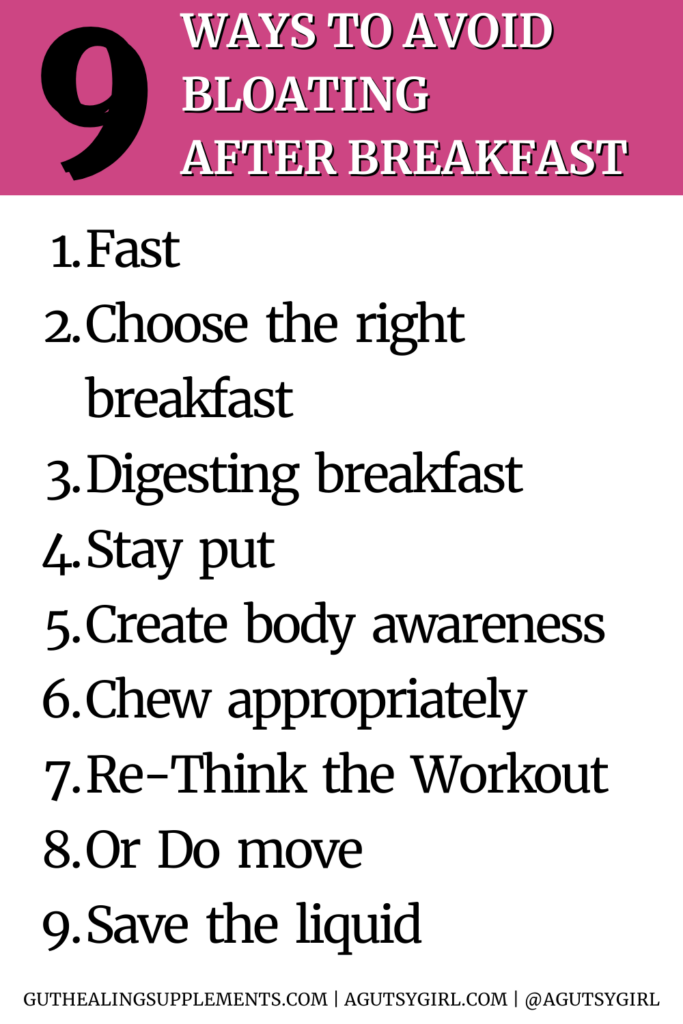
Ready to Ditch the Bloat for Good?
Reduce bloat and normalize weight by getting out of the start-and-stop “gut healing” cycle.
In just 21 short days, you’ll be light years ahead of where you’re at today.
Try any one of these or all of them and watch the morning bloat disappear.
Let me know if you have questions!
If you liked this post, you might also enjoy:
- Why You Might be Bloated and Constipated
- 18 Life Improvements When You Heal Your Gut
- 15 Ways to Deal with Constipation
Xox,
SKH
🤰 bloating be gone! weight loss through optimal gut health for women
💃ʜᴇᴀʟ ʏᴏᴜʀ ɢᴜᴛ. ʜᴇᴀʟ ʏᴏᴜʀ ʟɪfe.
🫶🏻 founder gutbyome.com

